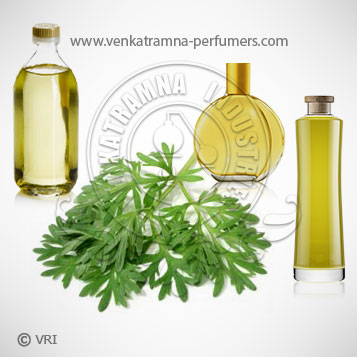
| Botanical Name | Artmesia absinthium |
| Common Name | Wormwood Essential Oil. |
| Country of Origin | USA |
| Solubility | Insoluble in water, soluble in alcohol and oils |
| Specific Gravity | 0.924 |
| Optical Rotation | Not Applicable |
| Refrective Index | 1.4610 - 1.4770 |
| PlantPart | Leaves and Twigs |
| Bland With | Jasmine, lavender, oak moss and orange. |
| CAS No | 8008-93-3 |
| Flash Point | 78 °C |
| Extraction Method | Steam Distilled |
We offer Wormwood Essential Oil that is very much in demand because of its powerful medicinal properties. The extraction offered by us is of high concentration and purity and retains the distinctive smell of wormwood. The Essential Oil of Wormwood is extracted by steam distillation of its leaves, twigs, and flowering tops and is chiefly composed of alpha thujone, beta thujone, geranyl propionate, linalyl acetate, myrcene, sabinene, trans sabinol, and trans sabinyl acetate.
Wormwood is native to Asia and is considered to have toxic components. Artemisia, one of the larger genera in the family Asteraceae and the largest genus in the tribe Anthemideae, comprises from 200 to more than 500 taxa at the specific or subspecific level. Many Artemisia species have a high economic value in several fields, as food plants and as anti-helminthic and antimalaria in medicine. The spectacular fact about Wormwood is that it was used by Hippocrates, the ancient Greek Physician and the father of western medicine. Many ancient monks and nuns used this bitter herb in the form of an elixir for its detoxifying properties. The English name wormwood may come from its traditional use as a vermifuge against intestinal parasites. However, wormwood oil’s most famous use is in the preparation of absinthe.
Color : Dark Green liquid with Aromatic earthy odor,
Aroma : It is considered to be aromatic.
a-thujone, chamazulene , nuciferol propionate, nuciferol butanoate, b-thujone, geranyl propionate, linalyl acetate, myrcene, sabinene, trans-sabinol and trans- sabinyl acetate.
The Wormwood Essential Oil is used in the preparation of various medicines for stomach ailments like indigestion, gastric pain, lack of appetite, as well as the related problems of heartburn and flatulence, fevers, dysentery, asthma, burns, anemia. It also stimulates the liver and gallbladder secretions and is a reliable cure for jaundice. The wormwood plant has a long history in folk medicine, and is best known as the key ingredient in the intoxicating drink absinthe, long consumed by artists because they believed it stimulated creativity. Scientific research also shows that wormwood can even kills cancer cells. It can also be used to treat anorexia, insomnia, anemia, a lack of appetite, flatulence, stomach aches, jaundice and indigestion. Wormwood herb is used in alcoholic beverages.